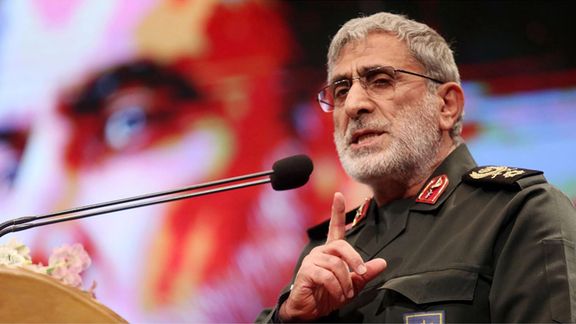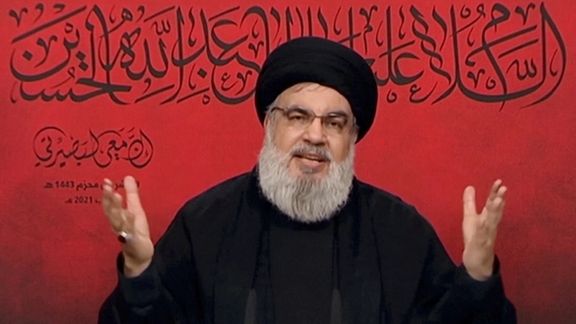Iran Keen To Avoid Escalation With Israel, Report Says

The head of Iran’s Quds Force held talks with Hezbollah in Lebanon in February to assess risks of an Israeli attack that would endanger Tehran’s main proxy ally in the region, Reuters reported.

The head of Iran’s Quds Force held talks with Hezbollah in Lebanon in February to assess risks of an Israeli attack that would endanger Tehran’s main proxy ally in the region, Reuters reported.
In Beirut, Quds chief Esmail Ghaani (Qaani) met Hezbollah leader Hassan Nasrallah, multiple sources told Reuters, for at least the third time since Hamas' deadly October 7 attacks on southern Israel and Israel's devastating retaliatory assault on Gaza.
The conversation turned to the possibility of a full Israeli offensive against Hezbollah on its northern border. As well as damaging the Shiite Islamist group, such an escalation could pressure Iran to react more forcefully than it has so far since October, three of the sources, Iranians within the inner circle of power, said.
Over the past five months, Hezbollah, a sworn enemy of Israel, has shown support for Hamas in the form of limited volleys of rockets fired across Israel's northern border.
At the previously unreported meeting, Nasrallah reassured Ghaani he didn't want Iran to get sucked into a war with Israel or the United States and that Hezbollah would fight on its own, all the sources said.
"This is our fight," Nasrallah told Ghaani, said one Iranian source with knowledge of the discussions. It is not clear why Iranian sources would share this information with Western media at this juncture, as Israel continues to hit selected Hezbollah targets in Lebanon.

Calibrated to avoid a major escalation, the skirmishes in Lebanon have nonetheless pushed tens of thousands of people from their homes either side of the border. Israeli strikes have killed more than 200 Hezbollah fighters and some 50 civilians in Lebanon, while attacks from Lebanon into Israel have killed a dozen Israeli soldiers and six civilians.
In recent days, Israel's counter-strikes have increased in intensity and reach, fuelling fears the violence could spin out of control.
Israeli Defence Minister Yoav Gallant indicated in February that Israel planned to increase attacks to decisively remove Hezbollah fighters from the border in the event of a Gaza ceasefire, although he left the door open for diplomacy.
In 2006, Israel fought a short but intense air and ground war with Hezbollah that was devastating for Lebanon.
Israeli security sources have said previously that Israel did not seek any spread of hostilities but added that the country was prepared to fight on new fronts if needed. An all-our war on its northern border would stretch Israel’s military resources.
Iran and Hezbollah are mindful of the grave perils of a wider war in Lebanon, two of the sources aligned with the views of the government in Tehran told Reuters, including the danger it could spread and lead to strikes on Iran's nuclear installations.
The Beirut meeting highlights strain on Iran's strategy of avoiding major escalation in the region while projecting strength and support for Gaza across the Middle East through allied armed groups in Iraq, Syria and Yemen, analysts said.
Yemen’s Houthis have so far done more damage in support of Hamas by launching dozens of missile and drone attacks against international shipping in the Red Sea region. The attacks began in November after Iran’s Ali Khamenei called on Muslims to blockade Israel.
Ghaani and Nasrallah "want to further insulate Iran from the consequences of supporting an array of proxy actors throughout the Middle East." Jon Alterman of Washington's Center for Strategic and International Studies think tank told Reuters.
"Probably because they assess that the possibility of military action in Lebanon is increasing and not decreasing."
IN ISRAEL'S SIGHTS
Ghaani and Nasrallah between them hold sway over tens of thousands of fighters and a vast arsenal of rockets and missiles. They are main protagonists in Tehran's network of allies and proxy militias, with Ghaani's elite Quds Force acting as the foreign legion of Iran's Revolutionary Guards.
While Hezbollah has publicly indicated it would halt attacks on Israel when the Israeli offensive in Gaza stops, US Special Envoy Amos Hochstein said last week a Gaza truce would not automatically trigger calm in southern Lebanon.
Arab and Western diplomats report that Israel has expressed strong determination to no longer allow the presence of Hezbollah's main fighters along the border, fearing an attack similar to Hamas' incursion that killed 1,200 people and took 253 hostages.
"If there is a ceasefire in (Gaza), there are two schools of thought in Israel and my impression is that the one that would recommend continuing the war on the border with Hezbollah is the stronger one," Sima Shine, a former Israeli intelligence official who is currently head of the Iran program at the Institute for National Security Studies, told Reuters.
A senior Israeli official agreed that Iran was not seeking a full-blown war, noting Tehran's restrained response to Israel's offensive on Hamas.
"It seems that they feel they face a credible military threat. But that threat may need to become more credible," the official said.
"FIRST LINE OF DEFENCE"
A war in Lebanon that seriously degrades Hezbollah would be a major blow for Iran, which relies on the group founded with its support in 1982 as a bulwark against Israel and to buttress its interests in the broader region, two regional sources said.
An Iranian security official speaking to Reuters acknowledged however that the costs of such an escalation could be prohibitively high for Iran's allied groups. Direct involvement by Iran, he added, could serve Israel's interests, and provide justification for the continued presence of US troops in the region.
Given Tehran's extensive, decades-long ties with Hezbollah, it would be difficult, if not impossible, to put distance between them, one US official said.
Since the Hamas attack on Israel, Iran has given its blessing to actions in support of its ally in Gaza, but it has stopped well short of an unfettered multi-front war on Israel that Hamas had likely expected Iran to support after October 7.
Before the Beirut encounter with Nasrallah, Qaani chaired a two-day meeting in Iran in early February along with militia commanders of operations in Yemen, Iraq and Syria, three Hezbollah representatives and a Houthi delegation, one Iranian official told Reuters.
Revolutionary Guard's Commander-in-Chief Major General Hossein Salami was also present, the official said. Hamas did not attend.
"At the end, all the participants agreed that Israel wanted to expand the war and falling in that trap should be avoided as it will justify the presence of more US troops in the region,” the official said.
Shortly after, Qaani engineered a pause in attacks by the Iraqi groups. So far, Hezbollah has kept its tit-for-tat responses within what observers have called unwritten rules of engagement with Israel.
According to the Iranian insider, Supreme Leader Ayatollah Ali Khamenei is not inclined to see a war unfold on Iran, where domestic discontent with the ruling system last year spilled over into mass protests.